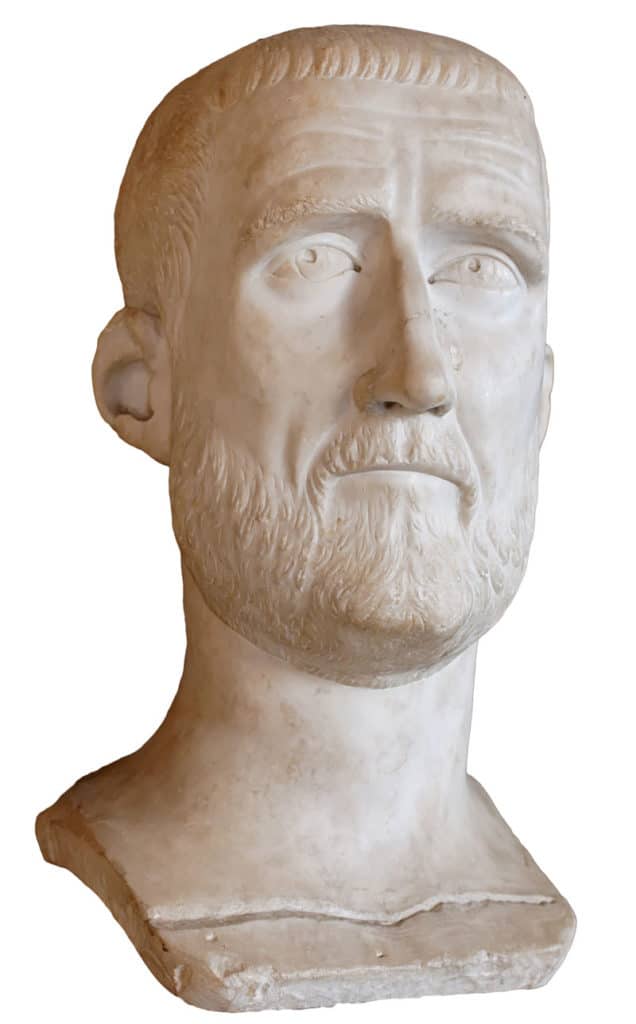Life: AD 232 – 282

- Name: Marcus Aurelius Equitius Probus
- Born on 19 August AD 232 at Sirmium.
- Consul AD 277, 278, 279, 281, 282.
- Became emperor in July AD 276.
- Died near Sirmium, September AD 282.
- Deified AD 282.
Marcus Aurelius Equitius Probus was born at Sirmium on 19 August AD 232.
His family origins are unclear. According to various accounts his father was either a market-gardener, a minor state official, or a soldier.
Probus’ early military career is largely unknown. He most likely rose through the ranks, achieving considerable skill in commanding troops. Under Aurelian he was said to be the emperor’s most outstanding commander. During that time, he defended the embattled Rhine frontier against the Alemanni.
Under Aurelian’s successor Tacitus he then took up a high command in Syria and Egypt. He possibly even held the overall military command of the eastern provinces.
When Tacitus had died in AD 276, Probus refused to accept Florian’s claim to the imperial throne. Far more, he claimed he was the man to whom Tacitus had promised the succession.
Considering Probus’ high standing among the army it is a possibility. But considering Tacitus’ evident plans of establishing a dynasty, it does indeed seem doubtful that he would have nominated Probus to succeed him.
Florian controlled the far larger army and marched on him. Their forces met near Tarsus. But at this point Probus’ excellent military ability won through. He avoided a direct confrontation and used the stifling summer heat of the Middle East, to which Florian’s European troops weren’t accustomed, to his advantage.
Suffering from heat stroke and fearing disaster, Florian’s men revolted and killed their leader, transferring their allegiance to Probus.
Probus then set out for Rome, where the senate confirmed him as emperor. And in turn the new emperor was careful to show great respect toward the senate. Under the new emperor’s regime the surviving murderers of Aurelian were executed.
Next Probus needed to address the situation along Rome’s frontiers. After the death of Aurelian, a series of attacks had taken place. Tacitus and Florian had largely dealt with the Gothic attack on Asia Minor (Turkey), but the German invasion across the Rhine had so far not been dealt with.
For the next two years Probus would be on campaign against the Germans. The Franks, the Longiones, the Burgundians and the Vandals were all defeated, despite their huge numbers.
At one point he even captured the leader of the Longiones, called Semnon. Although he let him return to his homeland with his surviving people once conditions had been agreed.
The campaigns were so successful, at one occasion sixteen German chiefs are said to have knelt at Probus’ feet. Hostages were taken to assure they remained peaceful and no less than sixteen thousand Germans were recruited into the Roman army.
In AD 278 Probus defeated yet another invasion by the Vandals.
In AD 279 the emperor set out for the east to deal with troubles having arisen there. The Moorish governor of Syria, Julius Saturninus, had declared himself emperor. On the way he repelled an invasion by the tribe of the Getae, who had crossed the lower Danube. Meanwhile the usurper Saturninus was killed either by his own soldiers or by assassins sent by the emperor. With his challenger dead, Probus next moved against brigands who fiercely defended themselves against the siege to their mountain fortress of Cremna in Isauria, but eventually were defeated.
Apart from the revolt of Saturninus, Probus’ main reason for travelling east was a desire to reconquer Mesopotamia. But once on the scene he deemed it unwise to begin a war with the Persians and instead came to a truce with Persian King Bahram II whereby both sides reassured each other of holding the peace (AD 279).
It might have been that Probus deemed the Persians too strong. But it probably is more likely that he decided the troublesome barbarians on the northern frontiers and possibly mutinous provincial governors demanded all his attention and hence made any action against the Persians impossible.
As he travelled back west, while passing through Thrace he agreed to settle 100’000 Scythians from the tribe of the Bastarnae in the area.
Soon after his presence was required in the west.
Proculus and Bonosus, the commanders of Gaul and Germany rose in revolt, declaring themselves joint emperors in AD 280. How far the support for the two rebels spread in unclear, though it might have reached as far as Spain. The crisis lasted several months, but eventually the rebellion was crushed and both Bonosus and Proculus were dead, the former by suicide the latter either died in battle or was executed.
Yet another rebellion arose in Britain, when its governor declared himself emperor. A Mauretanian commander named Victorinus was sent to crush that attempt and appeared to do so swiftly.
Toward the end of AD 281 Probus returned to Rome and held a triumph to mark his achievements. In the spring of AD 282 he headed for Sirmium on the Danube from where he alas hoped to prepare a campaign against Persians.
But morale in the army was by now very low. When not campaigning against barbarians or rebels, Probus had put them to work. They had been made to drain land, erect buildings and defences, build bridges, even plant vineyards.
Was Probus’ intent with all this work to undo the damage wrought upon the empire by countless past invasions, then its effect was to turn his army against him. After all, legionaries understood themselves being there to fight, not to plant vines.
The praetorian prefect Marcus Aurelius Carus was proclaimed emperor in September AD 282 by the armies stationed in Raetia and Noricum along the Upper Danube.
Probus, on hearing the news, immediately sent troops to engage Carus, defected to the other camp.
As this news reached Probus’ camp, the emperor’s cause was lost. His troops too decided to change their allegiance to Carus.
Probus was murdered by his own troops not far from his birth place Sirmium in late September AD 282.
He was laid to rest not in Rome but in a tomb near to Sirmium.

Historian Franco Cavazzi dedicated hundreds of hours of his life to creating this website, roman-empire.net as a trove of educational material on this fascinating period of history. His work has been cited in a number of textbooks on the Roman Empire and mentioned on numerous publications such as the New York Times, PBS, The Guardian, and many more.
